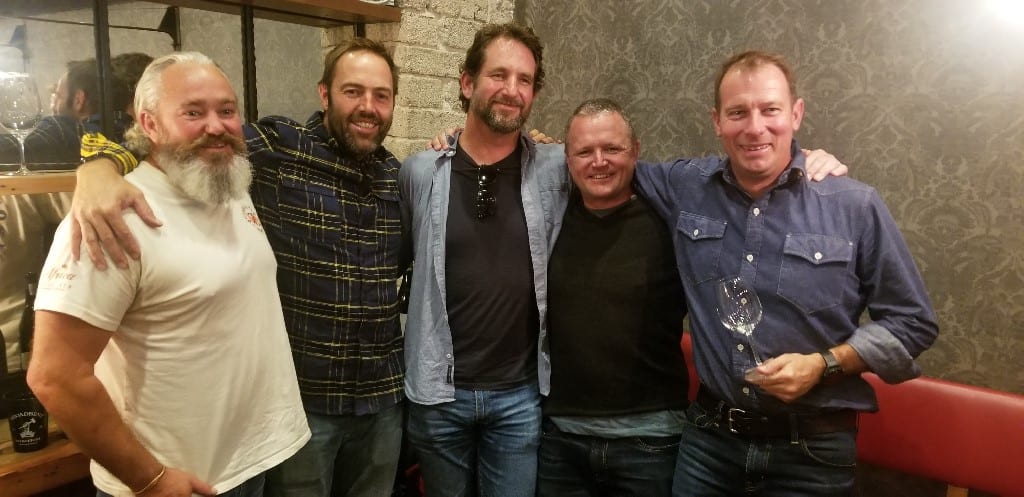08 Aug South African Wine Redefined
The wines being made in South Africa are pretty exciting to taste! I already knew how good the Chenin Blancs were but I had not tasted a Pinotage that I had liked until I attended a seminar entitled South Africa Redefined. Any preconceived ideas about this old world meets new world wine region need to be thrown out the window. Time to meet some of the winemakers focused on site-specific, terroir-driven wines that showcase what South Africa has to offer, as I wrote about in the Napa Valley Register, and am sharing here.
What types of wines do you think come from South Africa? Perhaps it is Pinotage or even Chenin Blanc. Or perhaps it is bulk wine, inexpensive wine or wine with animal labels.
South Africa has a 400-year-old history of making wine and while it may be “old-world,” South Africa is in many ways “new world.”
Twenty years ago, there were 300 wine producers in South Africa. Today there are approximately 750 producers. Many of these producers are focusing on specific sites to make terroir-driven wines. They are what is driving South Africa’s wine industry today and are redefining any preconceived ideas we may have.
Many have already recognized the quality of South African wines. There are more than 100 foreign investors in South Africa wine and one of them is Jackson Family Wines. Winemaker Graham Weerts started his career in South Africa and came to California over 15 years ago. He joined Jackson Family Wines and today is responsible for overseeing the vineyard and winemaking operations for Stonestreet, Arrowood and Matanzas Creek in Sonoma County, as well as Capensis in South Africa.
The Jackson family founded Capensis, located in the Western Cape, in 2013. Seeing the potential of South African wines, Weerts explained that “when you put a South African wine on the table, it is easy to see why it is at the apex of the wine world. This is not about bulk wine; it is not about large volume. Million case brands do not resonate with South Africa. The benchmark of South Africa is quality.”
Capensis, taken from the Latin word for “from the cape,” is produced from some of the highest-elevation vineyards in the Western Cape. With a love for Chardonnay, Weerts has produced a terroir-driven Chardonnay. With aromas of lemon zest, flowers and vanilla, the Capensis Chardonnay 2015 is a wine that is all about the palate. Lemon, peach, apple and saline notes fill the palate. The wine has beautiful depth and weight on the mid-palate as acidity dances around the rim.
The Capensis Chardonnay raises the bar on the quality of wines from South Africa. And to elaborate further on this benchmark, Weerts brought a group of his winemaking friends from South Africa for a tour around the U.S. to showcase their wines. Each of these brands, focusing on a wide range of wines, produce fewer than 1,000 cases, and they are each telling a story about the quality of South African wines.
AA Badenhorst Family Wines are from the Swartland appellation of South Africa. Owner and winemaker Adi Badenhorst grew up in Constantia where his grandfather was the farm manager of Groot Constantia, the oldest wine producing estate in South Africa and producers of the delicious dessert wine Constantia Wyn.
Adi and his cousin Hein purchased the 60 hectares property where they restored a winery from the 1930s. The vines are mostly old bush-vines planted in the 1950s and 1960s to Chenin Blanc, Cinsault and Grenache. The wines are made as naturally as possible.
2017 A.A. Badenhorst 2017 Ramnasgras Cinsault, Swartland, South Africa — This wine has a beautiful nose of wild berries, rhubarb, clove and nutmeg and on the palate the wine is fresh with bright acidity and fine tannins.
Beeslaar is from Stellenbosch and is the label of Abrie Beeslaar who was the winemaker at Kononkop, famous for its Pinotage. Beeslar founded his own label in 2011 and produces 750 cases of Pinotage from 2.5 hectares of bush-vines. The vineyard is 200 meters above sea level with soils of well-drained shale soils. The Pinotage is aged for 17 months in French oak, 50 percent of which is new oak. Pinotage ripens quickly and ferments very fast. It grows well but can be messed up in the cellar, which is why it has a bad reputation.
Beeslaar Pinotage 2016, Stellenbosch —If you have ever questioned whether you like Pinotage, this is the one that will make you answer in the affirmative. It is ripe and powerful with perfumed floral notes, good structure and good acidity.
Sadie Family Wines, founded in 1999, is located in the Swartland Mountain Areas. Owner and winemaker Eben Sadie, who was named the Institute of Masters of Wine 2017 Winemakers’ Winemaker, produces site specific wines. Sadie produces primarily Rhone varieties from revitalized old vines from a variety of terroirs, including granite, chalk, clay and sandstone. In addition to Rhone varieties on the 24 hectares of land, Sadie is planting an additional 12 hectares with Greek grapes Xinomavro and Assyrtico, Italian grapes Negroamaro, Fiano and Aglianico and more.
Sadie Family Soldaat 2017 – Made from 100% grenache, this wine smells like a full plate of dinner. It is meaty and savory with aromas of cooked greens. On the palate the wine is full bodied with bright delicate acidity and a mouthwatering finish.
Beaumont Family Wines is located in the heart of the town of Bot River in the Overberg. The farm is home to the region’s oldest wine cellar, dating back to the 1700s. Founded in 1974 by Jayne and Raoul Beaumont, the winery is run by their oldest son Sebastien Beaumont. After studying winemaking and working in Australia, California, Germany and France, Beaumont returned home where he produces the flagship Chenin Blanc, as well as Pinotage, Bordeaux grapes and more.
Beaumont Family Wines Hope Marguerite 2018 – Named after Hope Marguerite Beaumont, this 100 percent Chenin Blanc wine is elegant and complex like the woman it was named after. Fermented and aged in French oak, the wine has stone fruit, tangerine peel, honey and mineral notes. On the palate, the wine is dense and complex with beautiful acidity.
It is time to learn the stories of South African winemakers and drink their wines because they are redefining how we know South African wine, and the wines are delicious.
Read the original story in the Napa Valley Register.
Discover more from Please The Palate
Subscribe to get the latest posts sent to your email.




